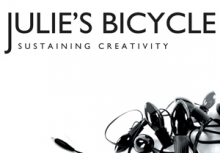The Broadway Green Alliance (BGA): was founded in 2008 in collaboration with the Natural Resources Defense Council. The Broadway Green Alliance is an ad hoc  committee of The Broadway League and a fiscal program of Broadway Cares/Equity Fights AIDS. Along with Julie’s Bicycle in the UK, the BGA is a founding member of the International Green Theatre Alliance.
committee of The Broadway League and a fiscal program of Broadway Cares/Equity Fights AIDS. Along with Julie’s Bicycle in the UK, the BGA is a founding member of the International Green Theatre Alliance.
Julie's Bicycle: Julie’s Bicycle is a London based charity that supports the creative community to act on climate change and environmental sustainability. We believe that the creative community is uniquely placed to transform the conversation around climate change and translate it into action.
We provide the creative community with the skills to act, using their creativity to influence one another, audiences and the wider movement. We run a rich programme of events, free resources and public speaking engagements, which contribute to national and international climate change policy development.
Theatre Green Book: Newly developing resource on sustainable productions, sustainable buildings, and sustainable operations.
Sustainable Cinema: A Historical Timeline of the Best Environmental Movies and Documentaries: a list of movies that are the finest examples of sustainability in cinema including:
Captivating dramas that serve as thought-provoking debate topics
Child-friendly animations that form the base of class-time discussions
Documentaries with a direct message that can encourage viewers to look up their local green organizations or start petitions
 alike seems to suggest, the world of nature, of Stratford-upon-Avon and the English countryside, was never far from his heart or his pen. What do Shakespeare’s works, written during the first wave of early modern mass urbanization, tell us about views of our natural world, then and now? How do his works (and the production of those works) relate to 21st century sustainability movements? In this episode, we discuss Shakespeare the environmentalist. Guests: Sir Jonathan Bate (Foundation Professor of Environmental Humanities at Arizona State University); Susan Hilferty (Tony and Obie Award-winning costume and scenic designer; Chair, Department of Design for Stage and Film at NYU’s Tisch School of the Arts); and Davis McCallum (Artistic Director, Hudson Valley Shakespeare Festival)
alike seems to suggest, the world of nature, of Stratford-upon-Avon and the English countryside, was never far from his heart or his pen. What do Shakespeare’s works, written during the first wave of early modern mass urbanization, tell us about views of our natural world, then and now? How do his works (and the production of those works) relate to 21st century sustainability movements? In this episode, we discuss Shakespeare the environmentalist. Guests: Sir Jonathan Bate (Foundation Professor of Environmental Humanities at Arizona State University); Susan Hilferty (Tony and Obie Award-winning costume and scenic designer; Chair, Department of Design for Stage and Film at NYU’s Tisch School of the Arts); and Davis McCallum (Artistic Director, Hudson Valley Shakespeare Festival)
